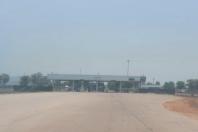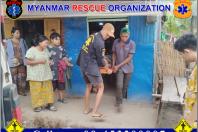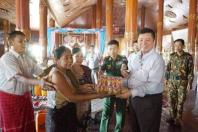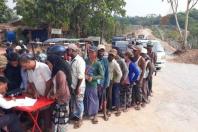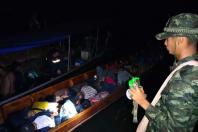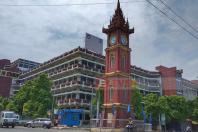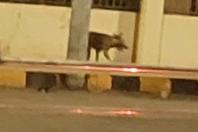TAIPEI (The China Post) – Taoyuan City is a city with one of the highest number of military dependent villages in Taiwan. It has 86 among a total of 886 villages in the whole of Taiwan, second only to Taipei City.
Taoyuan is a city with multiple ethnic groups. From the early Min, Hakka, indigenous people to today’s new immigrants from Southeast Asia and foreign spouses coming to live permanently in the country, it has become the fifth municipality with the largest registered population in Taiwan.
In 2001, Taoyuan took the lead in initiating the cultural preservation of military dependents’ villages and began organizing its annual “Taoyuan Military Dependents’ Villages Cultural Festival.”

Later on, with the cultural bureau of the municipal government as its spearhead, it established the “Taoyuan Military Dependents’ Villages Iron Triangle,” which is composed of Zhongli Mazu New Village, Guishan Xianguang Second Village and Daxi Taiwu New Village with all their interconnected cultural village lives.
Among them, Mazu New Village was the only village in Taoyuan to have been selected by the Ministry of National Defense in 2012 as one of the 13 national “Cultural Preservation Areas for Military Dependents’ Villages.”
The name of the village was not derived because the local residents came from Matsu but it was during a trip when the late President Chiang’s wife, Song Mei-Ling led the Armed Forces Entertainment Regiment to visit Matsu and enhance troop morale.
She discovered that if they can help settle the families of the army’s frontline officers and soldiers in Taiwan, they would be able to stabilize the military’s heart.

As such, she ordered a village built for the General, Colonel and Lieutenant-ranked officers and because of its unique history, it was dubbed the “Taoyuan General’s Village” where the “skies are brightly lit by the stars.”
During the preservation process, Ms. Ma, a former resident of Mazu New Village who had lived in the village for 43 years, moved to the reconstructed Luguang Fifth Village, after its demolition.
“I had a hard time adjusting at the beginning. Here, the space is very small. Before our house had a big yard, where we had planted a lot of vegetables and since space was relatively bigger and more open, our elders, the residents were able to interact freely with one another. We, all, had a very good relationship and we would help each other. Now, everyone just locks their doors and stay inside. In the past, we would not even lock our doors.”

Ms. Ma said that many people, like her, felt that would it not be better if the whole place was preserved and the residents could still live inside. However, with rebuilding, it would be difficult to find similar materials and later on, she gradually changed her mind.
Now she feels that as long as this place is still intact, the physical object is still preserved, then there is a place to anchor their memories. She can still reminisce about the life that they had in the recent past.
Ms. Ma gave an emotional description of the place. “I think the significance of the culture of the military dependents’ village is to preserve the history and the memory. In the past, people from other provinces came to Taiwan because of the war and by marrying the local residents, settling down, their languages, culture and living habits gradually influenced each other.”
“From the early years of ties with their provinces to ethnic integration, differences and discrimination gradually disappeared; all these slowly formed today’s Taiwan society. The history of a place is very interesting and complex. If these things slowly disappear in the process of time, I think it will be an extremely sad thing to happen.”
“After all, this forms the fabric of our lives and the military dependents’ villages are places that are full of cultural significance and historical memories.” said Ms. Ma.

Compared to other Taoyuan military dependents’ villages, Mazu New Village now plans to go towards the direction of creating a“Culture Creative Industry Park”and a“Movie and Television Base,”which will allow entrepreneurs involved in the cultural and creative industries to smoothly penetrate the market and connect with the industry chains, as well as promote an experiential economy through cross-border integration.
In addition to the scenes that have been filmed by many TV dramas, the “Taoyuan Light and Shadow Film Museum,” which was converted from the original events center, also regularly hosts thematic film exhibits and film festivals, as well as cultivate talents in the field of documentary filming.
In the future, the government is also expected to launch a B&B, take a more proactive role by providing a cultural experience platform, which would house cultural relics, original household story exhibitions and guided tours of aboriginal households.
On holidays, there would also be art and cultural activities, such as lectures, outdoor concerts and holiday markets, etc… Furthermore, it will also invite artists and work with students from the local university’s art and design departments to revitalize the historical and architectural space.
The other two villages that form part of the Iron Triangle are Xianguang Second Village and Taiwu New Village. Xianguang Second Village is the only village used as Military Police Dormitory Group in Taoyuan and military ranks are not high. It has a remarkable folk culture and now, a “quasi-museum” is being planned.
Furthermore, since Taoyuan is an immigrant city, it is also planning to build an “immigrant museum,” which would tell the stories of the integration of different ethnic groups. The Taiwu New Village was originally built for the families of the Army generals and colonels, who had participated in the 823 Artillery Bombardment.
Funds came from the sales of ammunition shells that were dropped in the battle at Kinmen and from various fundraising activities. It was named after a well-known landmark of Kinmen, the Taiwu Mountain. Plans are also in place for the creation of an “August 23 Artillery Battle Museum” in the future.
Mazu New Village is the second village in the country to be preserved under the “Cultural Assets Preservation Law” after the Forty-four South Village in Taipei. It was registered as a historical architecture in 2004 and was awarded cultural asset status.

Although it does not have the largest preserved number of military dependents’ villages in terms of area in the country nor does it have a unique military-industrial ruins landscape, Taoyuan remains a very important area in the cultural preservation movement of the villages.
At present, the three military dependents’ villages are being renovated, restored and enlivened. The Xianguang Second Village has an open multi-functional exhibition hall for the public to visit.
It is expected that repairs of the whole district will be completed in two years and a complete military dependents’ village will be seen.
Visit Information
Mazu New Village
Address: No. 155, Longji 2nd Street, Zhongli District, Taoyuan City
Opening hours: Tuesday to Sunday 9.00AM – 6.00PM
Tel: 03-2841866
Mode of transportation: from Zhongli Railway Station, take the Taoyuan Bus (1112 South Road, 115115, 500850085008) or Zhongli Bus (112112 North Road) and get off at Mazu New Village Station.
Xianguang Second Village
Address: Lane 138, Datong Road, Guishan District, Taoyuan City
Opening hours: Wednesday to Saturday 9.00AM – 5:30PM
Phone: 03- 3197132
Transportation: from Taoyuan Railway Station, take the Taoyuan Bus No. 7
→ get off at Datong Road Station → walk about 3-5 minutes and you will reach Xianguang Second Village.
Taiwu New Village
Address: corner of Ciguang Street and Ciguang 1st Street, Daxi District, Taoyuan City
Tel: 02-25506022 #19
Transportation: from Zhongli Railway Station, take the Taoyuan Bus No. 5098 and get off at Qiding Station. Walk south-north towards Jieshou Road and turn left at Ciguang Street and turn left again at Ciguang First Street.


